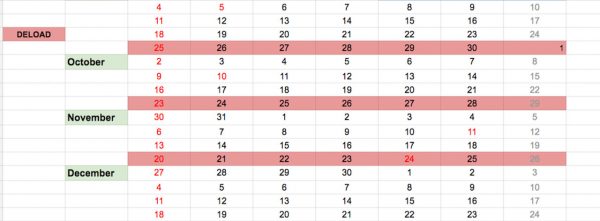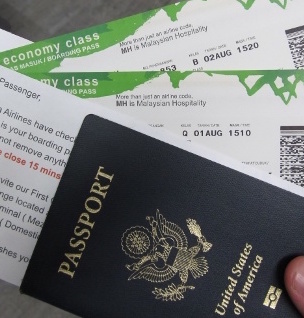The Deload Week for Work and Life

Why you should be taking 12 weeks off per year…
“In life, we must have flexibility. Our spirits must be able to move freely. To be too stiff and rigid is to be brittle and lacking in responsiveness.”
–Musashi
It’s a bit of an understatement to say that I’ve obsessed about work/life balance for a long time.
If you own 100% of your time you decide when to work, when to stop, and when to take a few days off. It’s a lot easier to just work endlessly while stressing out about how you’re not really ‘living the dream’.
At the beginning of this experiment I didn’t work enough, and now I work way too much. Most people who do this long enough realize the importance of staying in one place and developing routine, but excessive routine can become a self-imposed prison.
A few things I’ve learned about myself:
- I love to work.
- I need to feel like I’m 100% in control of my life.
- I need a lot of built-in recovery time.
- I can get really carried away with what I’m doing.
Big surprise, here’s the solution that balances this all out: Work in ruthlessly protected cycles with carefully-scheduled breaks.
As always, it’s the implementation of simple things that can trip you up.
“You are such a naive academic. I asked you how to do it, and you told me what I should do. I know what I need to do. I just don’t know how to do it.“
– Andy Grove quoted in Deep Work.
Taking a page straight out of strength-training I introduced a deload week into my life.
This is my second ‘One Thing’ this year, the first being reading a book a week. As I explained earlier, despite the simplicity these two things have had massive impacts on my life and trajectory.
The concept of the deload week is simple: every 4th week, drop the intensity and/or weight by 50% to give yourself a chance to recover.
This is already a fundamental part of my strength training–the key to preventing injury and maintaining progress–so the deload week wasn’t hard to apply to the rest of my life. I started working 3 weeks on followed by a deload week where I drop to 50% of my normal working time (which also syncs with my fitness schedule).
Practically speaking, cutting work time by 50% can mean:
- Working half days for part of the week and taking the last 2 days off.
- Shifting to work on something else I’ve been putting off, which creates a mental break through novelty.
- Traveling to a new place, which gives me a fresh perspective and shatters normal routines.
Having an enforced break every month also creates a deadline and sense of urgency during the 3 weeks leading up to it.

Having a week off a month frees up a ton of time and mental energy to explore things I haven’t had time for, to travel, get my shit together, or to just sit by the pool at home if that’s what I need to do.
The routines I use most of the time, while incredibly useful, can be damaging if pursued indefinitely. I’m one to put my head down and grind things out to a point of absurdity. Without picking your head up once and a while you can easily miss your the targets. Most of the time because the target has moved.
While routines are intended to automate basic decision-making so you can focus on what matters, I’ve noticed in my own life a significant emotional component that can go haywire. Sometimes, for whatever reason, a routine can go bad. Maybe you’re gradually loosing steam and motivation, maybe you’re living in a depressing place, etc, but the upshot is the routine starts to drive you into the ground instead of elevate you to the next level.
This is why the deload week is so useful: it’s good to tear the algorithm apart on a regular basis to keep it running properly. A lot of great ideas and energy for this comes from traveling, where I might pick up a new habit for the week that I find needs to be added in once I’m home. At the very least a great deal of new energy gets passed back into the system.
I’m not first or only one to think about the concept. I have a number of friends who have been doing variations of it for years with great success. It was also interesting to see Tim Ferris post about the same thing as I was working out the details of my own deload week.
Don’t you get less work done by ‘taking off’ a week a month?
No, it’s precisely the opposite, for a couple reasons.
First, during the deload week I 80/20 the hell out of any work I’m doing. That means I focus on the critical few things that need to get done. The rest of the work I would normally engage in is either very low-impact or experimental, with an unknown outcome. There’s no downside to temporarily cutting all of this.
Second, as Tim also wrote, my best ideas come during these weeks off. They’ve also led to some major changes in direction in life and business where more of the same would have only taken me further off course. Very often it’s more effective for me to not work than it is to blindly charge ahead without questioning the motives and the assumed outcomes.
“Don’t just do something. Stand there.”
My energy levels and motivation at the end of the deload week are sky-high, and I’m ready to jump back in with both feet. Grinding through a 4th, 5th, or 6th week without a break is way less effective than mixing it up.
The Deload week answers another important question.
“…beware of looking for goals: look for a way of life. Decide how you want to live and then see what you can do to make a living WITHIN that way of life.”
– Hunter Thompson’s Letter to a Friend
The big question has always been: how to get it all in?
Surprisingly enough, even with 100% control of your life it’s easy to slip into the deferred life plan. The thinking being something like ‘let me just build my business, then I’ll do X.’ Right.
I’ve recently been reminded that the warrior’s journey is long, and that if you want to ‘live the dream’ you should probably just do that now, don’t be in a hurry, and figure out how to make it work as you go along.
Taking one week partially- or fully- off means you have as many as 12 weeks a year to travel to a new country, start a new project or habit, or do something completely different. You’ll work twice as hard to make this work once you experience it.
I have no interest in doing anything, travel or work, indefinitely, but I want a lifestyle where I have an abundance of both.
I think 3 weeks on, 1 week off gets pretty close to this ideal.
A really important caveat
An idle mind is the Devil’s workshop.
It’s very important to stress that the deload week is in no way synonymous with sitting around, especially at home. The point here is alternate activity: new places, new routines, etc.
Do not make the mistake of thinking you can sit at home for a few days and recharge.
The Logistics of the Deload Week

[Photo: Recent Deload Week in Slovenia]
What does this look like in practice?
Important point: I utterly failed at implementing a deload week the first 4-5 times due entirely to planning failure.
I started testing the idea in mid 2015, but my trips either didn’t happen or were converted to ‘stay-cations’ at the last minute.
On one trip I got as far as the airport before realizing that 100% of accommodation was booked out in the place I wanted to visit (see my deload SOP below to avoid this idiocy). The others fizzled out as I tried to make last-minute travel arrangements (good luck doing that in European summer).
So how does someone with 5 years of consecutive traveling experience fail so miserably at logistics? Couple reasons:
- Planning and logistics are a lot harder during a tightly scheduled work sprint. There isn’t a whole lot of down-time to make travel planning happen when you’re in the zone. I also hadn’t totally committed to the concept of taking time off which meant prioritizing work over anything else (like trip planning).
- Out-and-back travel is more expensive and requires tighter logistcs. Once you have a full-time apartment, have to pay for the return flight, and have fixed dates the costs go way up. All this is normal for the real world and not a big deal, but makes me more time and budget conscious when planning. And, unlike full-time travel where you usually have a time limit on the place you’re staying, without a fixed deload week there is nothing forcing you to hit the road. Easy to let this slip.
Here’s how I fixed the glitch:
- Scheduling 2 hours per week on logistics on Saturdays, which gives me 6 total hours in 3 weeks to make it happen.
- Booking flexible accommodation and transportation as early as possible. Booking.com and Agoda both have free cancellation on most rooms, which means no-risk and Zero-BTUs spent on thinking about this. I’ll now book 2-3 rooms in different locations and keep the best plan later. You can also do this with some transportation options: Wizzair out of Hungary has a $10 flexible fare fee, so you can change your flight indefinitely (only added cost is difference in fare price but this usually isn’t too bad).
- Having 5-10 trip plans outlined a ready to go. Having a list of the next few places I’d like to visit with some basic logistics ready makes it easier to execute when the time comes. I have a Trello board called ‘trip planning’ where I can easily see this. I also create reusable trip plans so I can easily hit the same place again (Croatia, anyone?).
- Keeping trips as simple as possible. I don’t need to see everything anymore and I much prefer going to 1 great place and staying there for a week.
- Practicing effective decision-making. It doesn’t really matter where you go, the key is to get out of normal routines and living spaces, so pull a few options up and make it happen.
Deload Week Planning SOP
Here’s the actual standard operation procedure (SOP) I use now for trip planning.
Principles:
- The goal is to reboot, take a deep breath, get back up to 50,000 feet, and focus on other things besides grinding out work.
- You don’t have to travel, but travel helps get out of your routines and helps reflection.
- The goal is not constant movement, although it can be.
- You must plan these well ahead of time with a plan A and plan B, ready to deploy, with all logistics dealt with ahead of time.
- It’s better to leave on Saturday and come back earlier (Thursday/Friday) so there’s time to readjust before diving in again.
- Set 2 hours on Saturdays during your 3-week sprint to plan these out.
- Finalize the trip at least 1 week out.
- Book rooms on Booking.com or Agoda with free cancellation and set a reminder to confirm.
- Some weeks need to be ‘business of life weeks’, meaning that you are catching up on important things in your life:
- Major Decisions
- Focusing on getting closer to a non-work goal.
- More complicated Trip planning
- Etc.
- Look at your goals, and evaluate where you are.
- In order for your personal life to flow correctly you must take these personal SOPs as seriously as work SOPs.
- The suggested options are:
- Work 3 weeks, take 1 week off, repeat.
- Or work 6 weeks with a weekend trip in the middle and then take a week.
The quick travel checklist for booking a trip:
- 2 minutes – Check Booking.com and see what % booked is to make sure there are no holidays or events that time period. Goal is less than 80% booked.
- 5 minutes – Check transportation on Rome2Rio, Momondo, Wizzair, and Kayak (flexible date search) and make sure there are cheap and hopefully flexible options. More: Travel Apps I use Daily
- Make sure total trip cost is less than $100 per day.
Unplugging
A couple of rules:
- Keep your Tuesday work meetings, but skip the rest.
- Make sure all critical tasks are covered.
- Get the hell of the computer as much as possible for the week.
The Upshot
My first and most successful deload was a week spent hiking in Slovenia with some quality time sitting by the lake. Here’s the parting shot for this post:
Additional Resources:
- Deep Work by Cal Newport. See more on my /books/ page.
- Why You Need a “Deloading” Phase in Life (Tim Ferriss)
- 22 Things I’ve learned as a Digital Nomad
- The 9 Then 3 Lifestyle (TropicalMBA)





